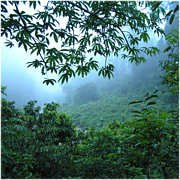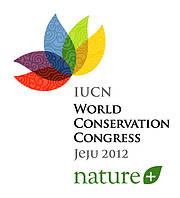IUCN Congress fully offset
18 February 2013 | News story
IUCN has fully offset the greenhouse gas emissions arising from the IUCN World Conservation Congress, which took place last September in Jeju, Republic of Korea.
As a world leader in environmental sustainability, IUCN proactively works to mitigate its activities and reduce its overall carbon footprint, including for the organisation of its World Conservation Congress every four years. IUCN’s Carbon Offset Policy is in place to ensure that all of the organization’s unavoidable greenhouse gas (GHG) emissions are compensated for through the purchase of credible, additional, and sustainable carbon offsets.
In total, the GHG assessment estimated that the Congress created 6,847 tons of CO2 eq. which have been fully offset. About 80% of the emissions were caused by participant and organizer travel.
The cost for the offsetting has been financed as follows:
- 1241 participants voluntarily contributed to the carbon offsetting by paying for the estimated emissions that their participation caused (travel and onsite emissions);
- IUCN paid the offsetting fees for all staff (364) and 51 VIPs;
- The host country collected and donated some CHF 8000 towards offsetting;
- IUCN topped up the totals raised with an additional CHF 5000 in order to fully offset all emissions.
The carbon offsetting is being undertaken through the Infapro project on improved forest management in Borneo, run by the organization Face the Future.
The oldest rainforest in the world 130 million years old, can be found in Borneo and is one of the last natural habitats for the endangered Orang-utan. In recent years, the establishment of oil palm plantations and unsustainable logging practices have resulted in rapid rates of deforestation and forest degradation, threatening the rich biodiversity of this island.
The Infapro project is one of the largest forest rehabilitation projects in Southeast Asia, and was selected due to its verified emissions reductions of a high standard and its significant biodiversity and social benefits. The project rehabilitates logged rainforest in Sabah, Malaysia, through sustainable forest management activities and works to avoid a second round of logging.
The project developer Face the Future, in cooperation with the Yayasan Sabah Foundation, has rehabilitated approximately 12,000 hectares (ha) of the targeted 25,000 ha of logged rainforest since 1992. This project employs a combination of climber cutting, enrichment planting, liberation thinning and prevention of re-logging. Find out more about the Infapro project here.
Emissions reductions from the Infapro project have been verified by the Verified Carbon Standard (VCS) and sustainable forest management is certified by the Forest Stewardship Council (FSC).
For more detailed information on the calculation of emissions for the 2012 IUCN Congress, please refer to the full Greenhouse Gas Emissions Assessment Report, as compiled by the Korea Environmental Industry & Technology Institute (KEITI), commissioned by the 2012 Congress host country.





